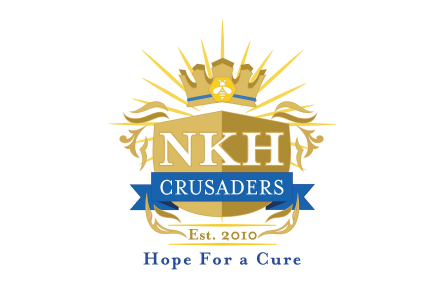NKH Crusaders
Cycle 3
NKH, AKA glycine encephalopathy (GCE), is a rare, devastating, and incurable disease; with a very wide spectrum of severity. Most babies born with this disorder die shortly after birth. Before death, they go through a period of lethargy, weak crying, muscle weakness, and seizures. Many babies that are born with this disease die within the first 3 months of life. Those who do make it past infancy will live with various lifelong issues. There are several forms of NKH.
Last updated 04/30/2025
Clinical
Disease Class
Gastroenterological diseases
Genetic diseases
Inherited metabolic disorder
Neurological diseases
Ophthalmic diseases
Respiratory diseases
Body Systems
Metabolic
Nervous / Sensory
Organs
Brain
Eyes
Intestines
Known Genetic Link
Yes, there are both genes that cause the condition and genetic factors that contribute
causative_genes
AMT
GCSH
GLDC
OCA2
contributory_genes
None specified / unknown
Type of Inheritance
Autosomal recessive
Newborn Screening
Yes, in some states
Disease Mechanism(s)
Inherited metabolic disorder
Mitochondrial disorder
Age of Onset
Early childhood (age 1+-5)
Infancy (age 0-1)
Prebirth
Average Age at Diagnosis
Early childhood (age 1+-5)
Infancy (age 0-1)
Life Expectancy
Adolescence (12-17)
Adulthood (age 18-64)
Early childhood (age 1+-5)
Infancy (age 0-1)
Middle childhood (6-11)
Affected Sex(es)
Female
Male
National Prevalence
101-1000
Global Prevalence
101-1000
National Incidence
Less than 10
Global Incidence
Less than 10
Symptoms / Phenotypes
breathing difficulties
developmental delay
fatigue
feeding difficulties
hypotonia
infection, unspecified location
movement disorders / ataxia / tremor
seizures / epilepsy
vision problems
Biomarkers
Other
Existing Therapies
Off-Label Drug Use
Organizational & Research
Cell Lines
Fibroblasts
Cell Lines, Institution
Not specified
Cell Lines, Involvement
Funded
Cell Lines, share
Unsure
Disease Model
Mouse
Zebrafish
Disease Model, Involvement
Funded
Disease Model, share
Some of our disease models are freely available
Clinical Trial Role
Not involved
Biobank, Institution
None
Center of Excellence, Institution
None
Registry
No, we do not have a registry, but we plan to create one
Natural History Study
No, we do not have a natural history study, but we plan to create or collaborate on one
FDA Patient Listening Session
Yes
FDA Patient-Focused Drug Development (PFDD) Program
No
ICD Codes
Yes, we have an ICD-10 code specific to our exact disease
Diagnostic Guidelines
No
Science Advisory Board Policies
Does not have an SAB
Research Network Policies
Has CRN but no policies
Research Roadmap
We don't have a Research Roadmap
International Chapters
None
International Partners
Europe
